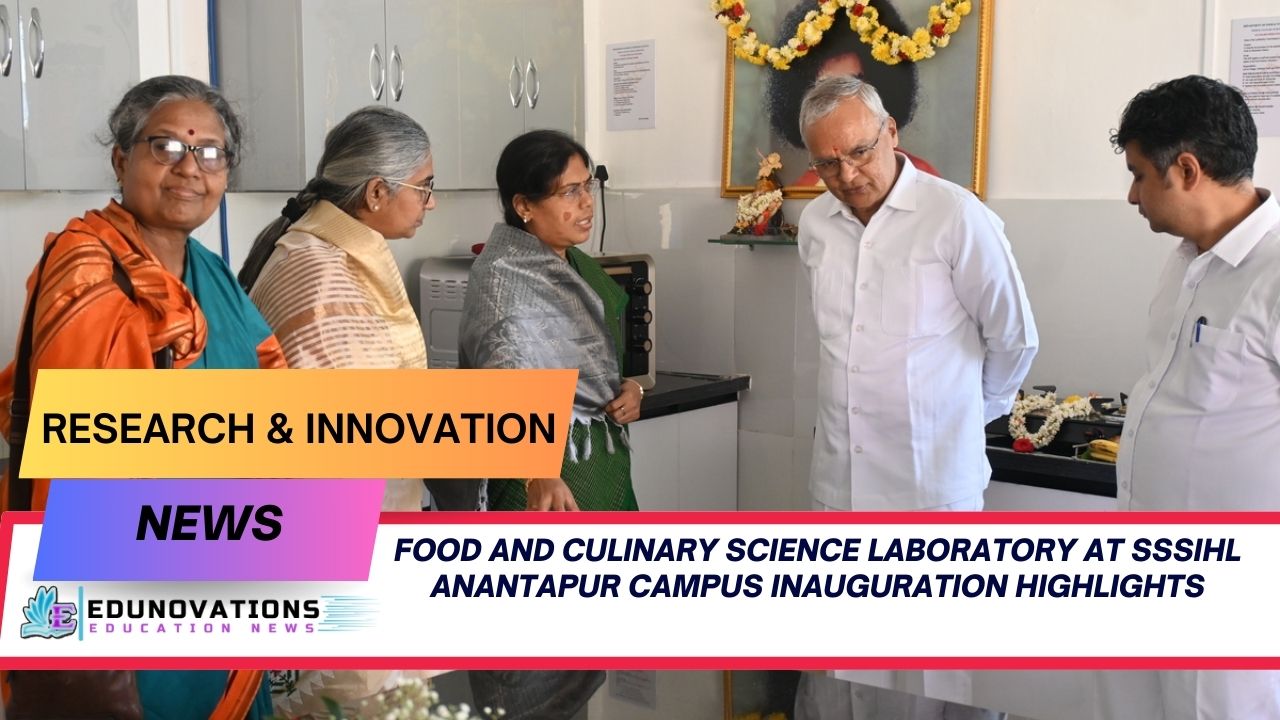Explore the inauguration of the Food and Culinary Science Laboratory at SSSIHL Anantapur Campus, advancing experiential learning in food science and nutrition.
The Department of Food and Nutritional Sciences at Sri Sathya Sai Institute of Higher Learning (SSSIHL), Anantapur Campus, recently celebrated the inauguration of the Food and Culinary Science Laboratory at SSSIHL Anantapur Campus, a state-of-the-art facility designed to advance experiential learning in food science and nutrition at SSSIHL. The event, held on 25 August 2025, marked a significant milestone in the institute’s commitment to fostering research, innovation, and hands-on learning for its students and faculty.
A Sacred Beginning: Divine Grace and Traditional Ceremonies
The inauguration ceremony was graced with the presence of the Vice Chancellor, Prof. B. Raghavendra Prasad, and the Registrar, Dr. Srikanth Khanna, along with esteemed members of the Sri Sathya Sai Central Trust, faculty, research scholars, and students of the department.
The program commenced with soulful Vedam chanting and Bhajans, setting a spiritual tone for the day. A Pooja and other auspicious ceremonies invoked divine blessings, culminating in the ceremonial lighting of the lamp by the dignitaries, symbolically dedicating the laboratory to the pursuit of knowledge and innovation in food science. The event concluded with Mangala Aarathi, expressing gratitude to Bhagawan Sri Sathya Sai Baba for His constant guidance and benediction.
Transforming Food Science Education through Innovation
The newly inaugurated laboratory is designed to provide students with opportunities for translational research in food processing and product development. Equipped with advanced instruments, it enables hands-on learning in areas such as:
- Nutritional analysis and quality assessment
- Innovative food technologies for health and sustainability
- Product formulation and culinary experimentation
According to Dr. Srikanth Khanna, the laboratory embodies SSSIHL’s vision of integrating scientific rigor with ethical and spiritual values, ensuring that students develop a holistic understanding of food and nutritional sciences.
Promoting Interdisciplinary Collaboration
The laboratory encourages interdisciplinary collaborations in food and nutritional sciences, fostering a culture where research transcends traditional academic boundaries. Faculty and students can collaborate on projects addressing public health challenges, sustainable food systems, and nutritional interventions.
Such initiatives also align with national and global trends in food science education, where universities increasingly focus on research-driven, experiential learning to prepare graduates for both academic and industrial careers.
Enhancing Research and Student Engagement
With the inauguration of this facility, SSSIHL students now have access to advanced infrastructure to:
- Conduct experiments in food safety and preservation
- Explore novel techniques in food processing
- Engage in applied research that bridges theory and practice
The lab also serves as a hub for innovative food technologies for health and sustainability, enabling students to design and test products that meet contemporary nutritional needs while addressing environmental challenges.
Toppers Use Mind Maps to score more than 95%
NCERT Class 11th Commerce Mind Maps
Add to cartOriginal price was: ₹999.00.₹199.00Current price is: ₹199.00.NCERT Class 12th Chemistry Mind Maps
Add to cartOriginal price was: ₹199.00.₹75.00Current price is: ₹75.00.NCERT Class 12th Commerce Mind Maps
Add to cartOriginal price was: ₹999.00.₹199.00Current price is: ₹199.00.NCERT Class 12th Science Mind Maps
Add to cartOriginal price was: ₹999.00.₹199.00Current price is: ₹199.00.NCERT Mind Maps For Class 10th
Add to cartOriginal price was: ₹999.00.₹199.00Current price is: ₹199.00.
Purchase Today
Expert Insights: Advancing Food Science Education
Dr. B. Raghavendra Prasad emphasized the transformative role of the laboratory in nurturing a new generation of food scientists who are not only technically proficient but also guided by ethical and holistic principles. He noted, “Experiential learning in food science and nutrition at SSSIHL ensures that our students are prepared to contribute meaningfully to society through innovation, research, and ethical practice.”
Such insights reflect global trends where universities prioritize translational research in food processing and product development, bridging the gap between laboratory studies and real-world applications.
Integrating Modern Tools with Traditional Knowledge
The Food and Culinary Science Laboratory blends modern scientific tools with the timeless principles of nutrition and culinary art. This integration allows students to explore interdisciplinary collaborations in food and nutritional sciences, ensuring comprehensive understanding and practical proficiency.
The lab is also envisioned as a center for workshops, guest lectures, and collaborative projects, further enhancing the learning ecosystem and promoting cross-functional research initiatives.
Community Impact and Future Prospects
The inauguration has already sparked interest among local and national researchers in the field of food science. By emphasizing innovative food technologies for health and sustainability, the laboratory is expected to contribute to:
- Development of nutritious, sustainable food products
- Research initiatives that support public health and wellness
- Collaborative projects with industries and research institutions
Through these initiatives, the laboratory reinforces SSSIHL’s commitment to societal well-being while cultivating leaders in food and nutritional sciences.
Enhancing Online Learning and Resources
Students and faculty at SSSIHL can complement laboratory learning with a range of educational resources:
- NCERT Courses: Explore courses
- Current Affairs Updates: Read here
- Study Notes: Access notes
- MCQs Practice: Practice online
- Video Lectures: Watch videos
- Syllabus Resources: View syllabus
- NCERT PDFs: Download free PDFs
- Mind Maps: Explore mind maps
These digital resources further enrich experiential learning and support a holistic academic experience.
Conclusion
The Food and Culinary Science Laboratory at SSSIHL Anantapur Campus represents a significant step forward in enhancing experiential learning in food science and nutrition at SSSIHL. By combining advanced research facilities, expert faculty guidance, and spiritual inspiration, the lab sets a benchmark for interdisciplinary research, innovative education, and community impact in the field of food and nutritional sciences.
With continued focus on translational research in food processing and product development, the laboratory is poised to become a leading hub for innovation and learning, inspiring students to contribute meaningfully to the future of food science and sustainability.
FAQs
- What is the Food and Culinary Science Laboratory at SSSIHL Anantapur Campus?
It is a state-of-the-art facility dedicated to advancing experiential learning in food science and nutrition. - Who inaugurated the Food and Culinary Science Laboratory at SSSIHL Anantapur Campus?
The lab was inaugurated by Vice Chancellor Prof. B. Raghavendra Prasad and Registrar Dr. Srikanth Khanna. - What facilities are available in the laboratory?
The lab includes advanced tools for nutritional analysis, food processing, product development, and culinary experimentation. - How does the lab promote experiential learning in food science and nutrition at SSSIHL?
It allows students to conduct practical experiments, engage in research, and develop innovative food products. - What kind of research is conducted in the laboratory?
The lab supports translational research in food processing and product development, food safety, and sustainable nutrition solutions. - Does the lab encourage interdisciplinary collaborations in food and nutritional sciences?
Yes, it fosters collaboration among faculty, students, and external research partners for innovative projects. - How does the laboratory contribute to innovative food technologies for health and sustainability?
By enabling the development and testing of nutritious, eco-friendly, and health-focused food products. - Can students access digital resources alongside lab training?
Yes, students can use NCERT Courses, notes, videos, MCQs, and free PDFs to complement learning. - What role does spirituality play in the laboratory’s activities?
Spiritual ceremonies, including Vedam chanting and Pooja, instill values of ethics and holistic learning. - How can new researchers collaborate with the laboratory?
Interested researchers can contact SSSIHL or partner institutions to explore joint projects and workshops.














